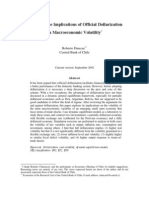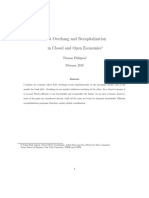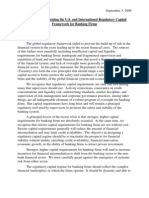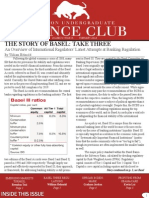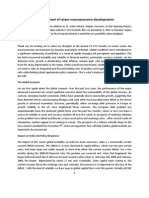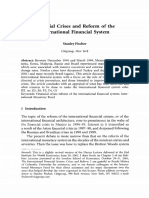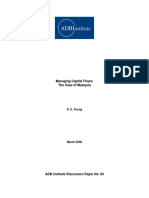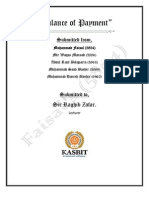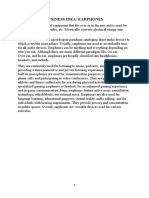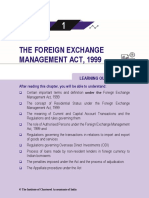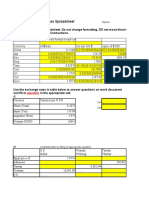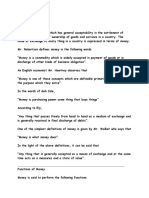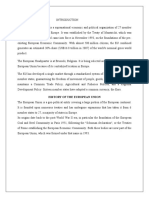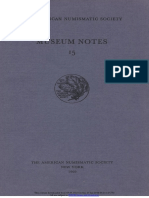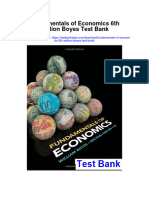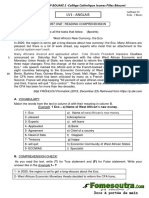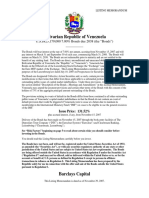Case Studies: Exchange Rate Regime Choice in A Postwar Country: Iraq
Case Studies: Exchange Rate Regime Choice in A Postwar Country: Iraq
Uploaded by
Boda TanviCopyright:
Available Formats
Case Studies: Exchange Rate Regime Choice in A Postwar Country: Iraq
Case Studies: Exchange Rate Regime Choice in A Postwar Country: Iraq
Uploaded by
Boda TanviOriginal Title
Copyright
Available Formats
Share this document
Did you find this document useful?
Is this content inappropriate?
Copyright:
Available Formats
Case Studies: Exchange Rate Regime Choice in A Postwar Country: Iraq
Case Studies: Exchange Rate Regime Choice in A Postwar Country: Iraq
Uploaded by
Boda TanviCopyright:
Available Formats
9
Case Studies
Exchange rate regime choice in a postwar country: Iraq
This case study draws heavily on Moosa (2004a, 2004b). Iraq is a case of
a postwar country that experienced hyperinflation resulting from exces-
sive currency printing. Between 1991 and 1995, the nominal value of
the currency in circulation jumped from 22 billion to 584 billion, giving
rise to an average annual inflation rate of 250 per cent. Monetary reform
in post-Saddam Iraq is an issue that has been dealt with in the academic
literature (for example, Hanke, 2003a; Roubini and Sester, 2003), in the
media (for example, Hanke, 2003b) and in policy documents (for exam-
ple, Sanford, 2003). King (2004) used the case of Iraq to demonstrate
that expectations of future collective decisions can have a major impact
on the value of a currency, irrespective of the policies pursed by the
current government.
One of the major tasks facing any civilian authority in a postwar
situation is to get the economy up and running. Central to this effort
is putting in place stable monetary conditions as a prerequisite for the
success of economic reconstruction. This is particularly the case if the
country in question has been enduring macroeconomic mismanage-
ment and inflationary monetary policy, which were the conditions that
Iraq endured for many years under the regime of Saddam Hussein. The
question that had to crop up, therefore, was the choice of exchange rate
regime, as this choice is a critical component of monetary reform in
Iraq. As expected, the views on this issue diverge between the extremes
of dollarization and free floating.
I argue that the optimal exchange rate regime under the prevailing
conditions is a currency board, while arguing against suggestions for
225
I. A. Moosa, Exchange Rate Regimes
© Imad A. Moosa 2005
226 Exchange Rate Regimes
adopting managed floating and other regimes. The basis of the argu-
ment for a currency board and against managed floating is that the
former imposes the discipline that the Central Bank of Iraq (CBI) needs
after years of monetary abuse. It is also argued that while a currency
board is a rather stringent system, it is an extreme measure that is
needed to deal with an extreme situation. There is no better way to curb
the temptation to monetize the deficit than a currency board, whereby
the central bank keeps a full foreign exchange cover at a fixed exchange
rate.
One argument against a currency board for Iraq is that the foreign
currency reserves needed to run the exchange rate arrangement can and
should be used more appropriately for the reconstruction of the coun-
try. Some counter-arguments can be suggested. The first is that this is a
price worth paying to achieve monetary stability and restore confidence
in the currency. The other counter-argument is that the foreign
exchange reserves required for a full cover are rather small relative to
the total cost of reconstruction. Assuming that the monetary base/GDP
ratio is 0.1 and that GDP in 2003 is $25 billion, the initial cover required
is $2.5 billion. This is a small fraction of the $100 billion or so needed to
finance reconstruction. The amount required for this purpose should be
readily available from the frozen Iraqi assets. Moreover, keeping full
reserves at the CBI gives it more credibility at a time when potential
transaction partners associate it with bankruptcy. This is not to mention
that the CBI needs to hold some reserves under other exchange rate
arrangements, albeit smaller amounts.
The arguments against a currency board for Iraq are the following:
. Difficulties of managing external shocks.
. The requirement of a strong fiscal policy in place.
. The possibility of serious consequences if an inappropriate level of the
fixed exchange rate is selected.
While there are no problems with these arguments in a general sense,
I find it unacceptable to put forward propositions that do not take into
account the specifics of the situation in Iraq and its priorities. Hence,
consider the following counter-arguments:
. To start with, the argument about shocks is mostly applicable to a
developed country with a diversified export base, not to a country that
derives 95 per cent of its foreign exchange revenue from a commodity
that is priced in US dollar terms. Iraq will be (for a long time to come)
You might also like
- ALORICA COE - ReviseDocument2 pagesALORICA COE - Revisebktsuna0201No ratings yet
- British Coins PDFDocument3 pagesBritish Coins PDFวิวัฒน์ สุกใส วรรณวิศาล0% (1)
- The 1997-98 Korean Financial Crisis: Causes, Policy Response, and LessonsDocument26 pagesThe 1997-98 Korean Financial Crisis: Causes, Policy Response, and LessonsFarhan SamiNo ratings yet
- Capital Account Convertibility in Bangladesh v2Document32 pagesCapital Account Convertibility in Bangladesh v2Nahid HawkNo ratings yet
- Roberto Duncan PaperDocument34 pagesRoberto Duncan Paperapi-3705874No ratings yet
- A) Measuring Exchange Rate MovementsDocument9 pagesA) Measuring Exchange Rate MovementsjobinNo ratings yet
- The Capital Account and Pakistani Rupee Convertibility: Macroeconomic Policy Challenges Irfan Ul HaqueDocument27 pagesThe Capital Account and Pakistani Rupee Convertibility: Macroeconomic Policy Challenges Irfan Ul HaqueMaria ChaudhryNo ratings yet
- Indian Economic EnvironmentDocument14 pagesIndian Economic Environmentrenu13205No ratings yet
- 6 Java FrameworksDocument5 pages6 Java FrameworksmittleNo ratings yet
- Innov. in Banking Proj.Document6 pagesInnov. in Banking Proj.Yog CoolNo ratings yet
- 6 Files MergedDocument10 pages6 Files MergedKrutibas DalaiNo ratings yet
- 1 Exchange Rate Regimes, Capital Account Opening and Real Exchange Rates - Evidences From ThailandDocument42 pages1 Exchange Rate Regimes, Capital Account Opening and Real Exchange Rates - Evidences From ThailandRafael FerreiraNo ratings yet
- Fema CDocument5 pagesFema Capi-3712367No ratings yet
- 4 IJFAES Vol. 3 No.9 Sept 2024 Paper3 M.emad2Document22 pages4 IJFAES Vol. 3 No.9 Sept 2024 Paper3 M.emad2المجلة الدولية للعلوم المالية والإدارية والاقتصادية IJFAES - EISSN: 2977-1498No ratings yet
- Public Sector Funding and Debt Management: A Case For GDP-Linked SukukDocument28 pagesPublic Sector Funding and Debt Management: A Case For GDP-Linked SukukSon Go HanNo ratings yet
- This Content Downloaded From 62.22.68.43 On Thu, 17 Feb 2022 10:11:15 UTCDocument43 pagesThis Content Downloaded From 62.22.68.43 On Thu, 17 Feb 2022 10:11:15 UTCnicodelrioNo ratings yet
- Submission 3 PDFDocument9 pagesSubmission 3 PDFsadiqpmpNo ratings yet
- Capital Account Convertibility IndiaDocument19 pagesCapital Account Convertibility IndiamanojbenNo ratings yet
- RBI Speech On Capital Account ConvertibilityDocument12 pagesRBI Speech On Capital Account Convertibilitynisha vermaNo ratings yet
- Chapter SummaryDocument4 pagesChapter SummaryIndri FitriatunNo ratings yet
- Tutorial Sheet 3Document5 pagesTutorial Sheet 3kinikinayyNo ratings yet
- IE 2 - Unit 1 - Financial Globalization in India - Renu KohliDocument14 pagesIE 2 - Unit 1 - Financial Globalization in India - Renu KohliTanya SinghNo ratings yet
- Bispap 73 ZZZDocument5 pagesBispap 73 ZZZshekarsm199No ratings yet
- Final Exam - International FinanceDocument59 pagesFinal Exam - International FinanceSusan ArafatNo ratings yet
- Economies 10 00076 v2Document17 pagesEconomies 10 00076 v2tiagoNo ratings yet
- Module 5 Banking LawDocument8 pagesModule 5 Banking LawShivamp6No ratings yet
- Debt Overhang and Recapitalization in Closed and Open EconomiesDocument30 pagesDebt Overhang and Recapitalization in Closed and Open EconomiesPeNo ratings yet
- Shat Zandt Arr 2Document11 pagesShat Zandt Arr 2Nicole HungNo ratings yet
- Public AdminDocument11 pagesPublic Adminashahadu.stuNo ratings yet
- MFDB Group Ass 735Document9 pagesMFDB Group Ass 735duchelucia20No ratings yet
- 86126-2203 Approach-Answer Economics Test 5 2023Document5 pages86126-2203 Approach-Answer Economics Test 5 2023bipinvaibhawpawan7091No ratings yet
- Reserve in USADocument29 pagesReserve in USAIftekhar Chowdhury PrinceNo ratings yet
- Appendix II: Fixed Vs Flexible Exchange RatesDocument4 pagesAppendix II: Fixed Vs Flexible Exchange RatesMasara OwenNo ratings yet
- Financial Globalization in India - Renu KohliDocument14 pagesFinancial Globalization in India - Renu Kohlitanu dixitNo ratings yet
- International Finance Ass2Document12 pagesInternational Finance Ass2ferrbrix100% (1)
- Global LinkagesDocument36 pagesGlobal Linkagesraashid91No ratings yet
- Capital Statement - Principles For Reforming Bank Regulations (09/03/09)Document14 pagesCapital Statement - Principles For Reforming Bank Regulations (09/03/09)DealBookNo ratings yet
- c4 PDFDocument20 pagesc4 PDFrichardck61No ratings yet
- The NCM Market Crisis and Search For Lasting Solutions 020512Document14 pagesThe NCM Market Crisis and Search For Lasting Solutions 020512ProshareNo ratings yet
- WUFC Issue 17 - FinalDocument5 pagesWUFC Issue 17 - FinalwhartonfinanceclubNo ratings yet
- The Issues, Objectives, and MethodologyDocument23 pagesThe Issues, Objectives, and MethodologyshahpinkalNo ratings yet
- RBI-An Assessment of Recent Macro Economic DevelopmentsDocument7 pagesRBI-An Assessment of Recent Macro Economic DevelopmentsAshwinkumar PoojaryNo ratings yet
- Scientific 2Document50 pagesScientific 2Juan Carlos Lara GallegoNo ratings yet
- Financial Crises and Reform of The International Financial SystemDocument37 pagesFinancial Crises and Reform of The International Financial SystemCamila Risso SalesNo ratings yet
- Capital Account Convertibility - Prespective 2000: What CAC MeansDocument4 pagesCapital Account Convertibility - Prespective 2000: What CAC MeansSanjeev MohapatraNo ratings yet
- Economics of Financial Institutions (Econ 3011) UNIT 7 PRESENTATION (Financial Crises)Document6 pagesEconomics of Financial Institutions (Econ 3011) UNIT 7 PRESENTATION (Financial Crises)Dornelle FitzpatrickNo ratings yet
- Lessons From The South African ExperienceDocument15 pagesLessons From The South African ExperienceEmir TermeNo ratings yet
- Working Paper Series: The CLS Bank: A Solution To The Risks of International Payments Settlement?Document51 pagesWorking Paper Series: The CLS Bank: A Solution To The Risks of International Payments Settlement?Flaviub23No ratings yet
- SUKUK NonDocument40 pagesSUKUK Nonaroosa azharNo ratings yet
- World Economy Financial Repression 1Document9 pagesWorld Economy Financial Repression 1dontmove14150No ratings yet
- Fischer 2010 Distinguished Lecture On Economics in Government Exchange Rate Regimes Is The Bipolar View CorrectDocument40 pagesFischer 2010 Distinguished Lecture On Economics in Government Exchange Rate Regimes Is The Bipolar View CorrectSOFIANE ETAMDINo ratings yet
- Assinment 01Document12 pagesAssinment 01Ms RawatNo ratings yet
- CH003Document12 pagesCH003SOFIANE ETAMDINo ratings yet
- E R R E P: Xchange ATE Egimes and Conomic ErformanceDocument24 pagesE R R E P: Xchange ATE Egimes and Conomic ErformanceKasey OwensNo ratings yet
- The Optimization of Everything: OTC Derivatives, Counterparty Credit Risk and FundingDocument8 pagesThe Optimization of Everything: OTC Derivatives, Counterparty Credit Risk and FundingsinghhavefunNo ratings yet
- Financial Liberalisation and Economic Growth in Nigeria: An Empirical AnalysisDocument10 pagesFinancial Liberalisation and Economic Growth in Nigeria: An Empirical AnalysisIOSRjournalNo ratings yet
- Adbi dp93Document36 pagesAdbi dp93SirPojiNo ratings yet
- Balance of PaymentDocument13 pagesBalance of PaymentMohammad Faisal MemonNo ratings yet
- GDP Linked Sukuk - RevisedDocument16 pagesGDP Linked Sukuk - RevisedrizaunNo ratings yet
- Islamic Finance: Issues in Sukuk and Proposals for ReformFrom EverandIslamic Finance: Issues in Sukuk and Proposals for ReformNo ratings yet
- Entrepreneurship - Business Plan DraftDocument20 pagesEntrepreneurship - Business Plan DraftBoda TanviNo ratings yet
- 1496 2018 03 20 Proposal - EngDocument10 pages1496 2018 03 20 Proposal - EngBoda TanviNo ratings yet
- Levels of Management With AnnoDocument14 pagesLevels of Management With AnnoBoda TanviNo ratings yet
- UntitledDocument426 pagesUntitledBoda Tanvi0% (1)
- 10 1108 - Ijssp 07 2020 0285Document21 pages10 1108 - Ijssp 07 2020 0285Boda TanviNo ratings yet
- Worksheet-5 Measurement of National Income - MacroeconomicsDocument2 pagesWorksheet-5 Measurement of National Income - MacroeconomicsBoda TanviNo ratings yet
- I. Case Study: ProcedureDocument2 pagesI. Case Study: ProcedureBoda TanviNo ratings yet
- How To Overcome Fear and Anxiety: What Makes You Afraid?Document5 pagesHow To Overcome Fear and Anxiety: What Makes You Afraid?Boda Tanvi100% (1)
- Eship Project 1 Arnav Utmani (Final)Document54 pagesEship Project 1 Arnav Utmani (Final)Boda TanviNo ratings yet
- Our People Practices: Strengthening The Talent PipelineDocument4 pagesOur People Practices: Strengthening The Talent PipelineBoda TanviNo ratings yet
- Error Message No f5702 Balance in Trassanction CurrencyDocument66 pagesError Message No f5702 Balance in Trassanction CurrencybiswajitNo ratings yet
- CMA P2 Section A FCDocument77 pagesCMA P2 Section A FCM AyazNo ratings yet
- The Foreign Exchange Management Act, 1999: After Reading This Chapter, You Will Be Able To UnderstandDocument76 pagesThe Foreign Exchange Management Act, 1999: After Reading This Chapter, You Will Be Able To Understandankur taunkNo ratings yet
- Exchange Rate Math Case Spreadsheet: NameDocument7 pagesExchange Rate Math Case Spreadsheet: NameRyan RebesNo ratings yet
- MoneyDocument16 pagesMoneyNighat SaeedNo ratings yet
- How To Transfer SLP From Ronin To Binance and Convert It Into PHPDocument13 pagesHow To Transfer SLP From Ronin To Binance and Convert It Into PHPFrancisco DicianoNo ratings yet
- History of The European UnionDocument21 pagesHistory of The European UnionSheejaVargheseNo ratings yet
- A Hoard of 'Porcupine' Sceattas / D.M. MetcalfDocument25 pagesA Hoard of 'Porcupine' Sceattas / D.M. MetcalfDigital Library Numis (DLN)No ratings yet
- Manila RCL SurchargeDocument1 pageManila RCL Surchargelalanhchanh1235No ratings yet
- API BX - Gsr.gnfs - CD Ds2 en Excel v2 9944795Document83 pagesAPI BX - Gsr.gnfs - CD Ds2 en Excel v2 9944795raviNo ratings yet
- Fundamentals of Economics 6th Edition Boyes Test BankDocument23 pagesFundamentals of Economics 6th Edition Boyes Test Bankelizabethmitchelldajfiqwory100% (36)
- UgandaDocument59 pagesUgandanurye614No ratings yet
- Countries in Europe Capital CurrencyDocument2 pagesCountries in Europe Capital CurrencyDonald francis UyNo ratings yet
- Civil Law ActDocument33 pagesCivil Law Actblackshadower0021No ratings yet
- Foreign Exchange, Remittance and Payments Financial ServicesDocument10 pagesForeign Exchange, Remittance and Payments Financial ServicesShubhra Jyoti HazraNo ratings yet
- Journal of The Numismatic Association of PDFDocument141 pagesJournal of The Numismatic Association of PDFAbdulhamidNo ratings yet
- Epreuves D'anglaisDocument2 pagesEpreuves D'anglaisevrad settinNo ratings yet
- Session 3 (Iii) International Parity Conditions IFM PDFDocument51 pagesSession 3 (Iii) International Parity Conditions IFM PDFrohan100% (1)
- MCB Online BankingDocument1 pageMCB Online BankingCharetti America - FranciscaNo ratings yet
- BBC Learning English - 6 Minute English - Bitcoin - Digital Crypto-CurrencyDocument38 pagesBBC Learning English - 6 Minute English - Bitcoin - Digital Crypto-CurrencyMohamad GhafooryNo ratings yet
- Onezone International General Trading LLC: QuotationDocument1 pageOnezone International General Trading LLC: QuotationSHABEEB ASHRAFNo ratings yet
- India's Digital Currency Its Acceptance and Legal StatusDocument5 pagesIndia's Digital Currency Its Acceptance and Legal StatusKunalNo ratings yet
- The Politics of Bitcoin Software As Right Wing ExtremismDocument55 pagesThe Politics of Bitcoin Software As Right Wing ExtremismjustingoldbergNo ratings yet
- Banking SystemsDocument71 pagesBanking Systemsapi-286512480No ratings yet
- Usp97475aj95 2038Document132 pagesUsp97475aj95 2038Daniel ChngNo ratings yet
- Beams Aa13e PPT 14Document43 pagesBeams Aa13e PPT 14Abeer Al OlaimatNo ratings yet
- Rahul Bajoria - The Story of The Reserve Bank of India (2018)Document301 pagesRahul Bajoria - The Story of The Reserve Bank of India (2018)sakshamkohli97100% (1)
- CH 10 Vocab Money and BankinggDocument3 pagesCH 10 Vocab Money and BankinggNelson OkunlolaNo ratings yet




